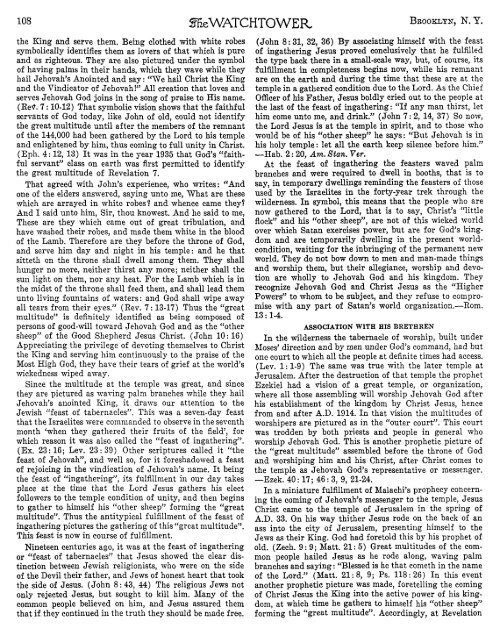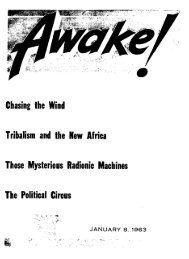announcing jehovah's kingdom - Watchtower Archive
announcing jehovah's kingdom - Watchtower Archive
announcing jehovah's kingdom - Watchtower Archive
Create successful ePaper yourself
Turn your PDF publications into a flip-book with our unique Google optimized e-Paper software.
108 SEeWATCHTOWER. BROOKLYN, N. Y.<br />
the King and serve them. Being clothed with white robes<br />
symbolically identities them as lovers of that which is pure<br />
and as righteous. They are also pictured under the symbol<br />
of having palms in their hands, which they wave while they<br />
hail Jehovah's Anointed and say: ''\Ve hail Christ the King<br />
and the Vindicator of Jehovah!" All creation that loves and<br />
serves Jehovah God joins in the song of praise to His name.<br />
(Re\1. 7: 10.12) That symbolic vision shows that the faithful<br />
servants of God today, like John of old, could not identify<br />
the great multitude until after the members of the remnant<br />
of the 144,000 had been gathered by the Lord to his temple<br />
and enlightened by him, thus coming to full unity in Christ.<br />
(Eph. 4: 12, 13) It was in the year 1935 that God's "faithful<br />
servant" class on earth was tirst permitted to identify<br />
the great multitude of Revelation 7.<br />
That agreed with John's experience, who writes: "And<br />
one of the elders answered, saying unto me, 'What are these<br />
which are arrayed in white robes 1 and whence came they1<br />
And I said unto him, Sir, thou knowest. And he said to me,<br />
These are they which came out of great tribulation, and<br />
have washed their robes, and made them white in the blood<br />
of the Lamb. Therefore are they before the throne of God,<br />
and serve him day and night in his temple: and he that<br />
sitteth on the throne shall dwell among them. They shall<br />
hunger no more, neither thirst any more; neither shall the<br />
sun light on them, nor any heat. For the Lamb which is in<br />
the midst of the throne shall feed them, and shall lead them<br />
unto living fountains of waters: and God shall wipe away<br />
all tears from their eyes." (Rev. 7: 13-17) Thus the "great<br />
multitude" is detinitely identitied as being composed of<br />
persons of good-will toward Jehovah God and as the "other<br />
sheep" of the Good Shepherd Jesus Christ. (John 10: 16)<br />
Appreciating the privilege of devoting themselves to Christ<br />
the King and serving him continuously to the praise of the<br />
Most High God, they have their tears of grief at the world's<br />
wickedness wiped away.<br />
Since the multitude at the temple was great, and since<br />
they are pictured as waving palm branches while they hail<br />
Jehovah's anointed King, it draws our attention to the<br />
Jewish "feast of tabernacles". This ...vas a seven-day feast<br />
that the Israelites were commanded to observe in the seventh<br />
month 'when they gathered their fruits of the field', for<br />
which reason it was also called the "feast of ingathering".<br />
(Ex. 23: 16; Lev. 23: 39) Other scriptures called it "the<br />
feast of Jehovah", and well so, for it foreshadowed a feast<br />
of rejoicing in the vindication of Jehovah's name. It being<br />
the feast of "ingathering", its fulfillment in our day takes<br />
place at the time that the Lord Jesus gathers his elect<br />
followers to the temple condition of unity, and then begins<br />
to gather to himself his "other sheep" forming the "great<br />
multitude". Thus the antitypical fulfillment of the feast of<br />
ingathering pictures the gathering of this "great multitude".<br />
This :feast is now in course of fulfillment.<br />
Nineteen centuries ago, it was at the feast of ingathering<br />
or "feast of tabernacles" that .Jesus showed the clear distinction<br />
between Jewish religionists, who were on the side<br />
of the Devil their father, and Jews of honest heart that took<br />
the side of Jesus. (John 8: 43, 44) The religious Jews not<br />
only rejected Jesus, but sought to kill him. Many of the<br />
common people believed on him, and Jesus assured them<br />
that if they continued in the truth they should be made free.<br />
(John 8: 31, 32, 36) By associating himself with the feast<br />
of ingathering Jesus proved conclusively that he fulfilled<br />
the type back there in a small-scale way, but, of course, its<br />
fulfillment in completeness begins now, while his remnant<br />
are on the earth and during the time that these are at the<br />
temple in a gathered condition due to the Lord. As the Chief<br />
Officer of his Father, Jesus boldly cried out to the people at<br />
the last of the feast of ingathering: "If any man thirst, let<br />
him come unto me, and drink." (John 7: 2, 14, 37) So now,<br />
the Lord Jesus is at the temple in spirit, and to those who<br />
would be of his "other sheep" he says: "But Jehovah is in<br />
his holy temple: let all the earth keep silence before him."<br />
-Hab. 2: 20, Am. Stan. Ver.<br />
At the feast of ingathering the feasters waved palm<br />
branches and were required to dwell in booths, that is to<br />
say, in temporary dwellings reminding the feasters of those<br />
used by the Israelites in the forty-year trek through the<br />
wilderness. In symbol, this means that the people who are<br />
now gathered to the Lord, that is to say, Christ's "little<br />
flock" and his "other sheep", are not of this wicked world<br />
over which Satan exercises power, but are for God's <strong>kingdom</strong><br />
and are temporarily dwelling in the present world·<br />
condition, waiting for the inbringing of the permanent new<br />
world. They do not bow down to men and man-made things<br />
and worship them, but their allegiance, worship and devo·<br />
tion are wholly to Jehovah God and his <strong>kingdom</strong>. They<br />
recognize Jehovah God and Christ Jesus as the "Higher<br />
Powers" to whom to be subject, and they refuse to compromise<br />
with any part of Satan's world organization.-Rom.<br />
13: 1-4.<br />
ASSOCIATION WITH HIS BRETHREN<br />
In the wilderness the tabernacle of worship, built under<br />
Moses' direction and by men under God's command, had but<br />
one court to which all the people at definite times had access.<br />
(Lev. 1: 1-9) The same was true with the later temple at<br />
Jerusalem. After the destruction of that temple the prophet<br />
Ezekiel had a vision of a great temple, or organization,<br />
where all those assembling will worship Jehovah God after<br />
his establishment of the <strong>kingdom</strong> by Christ Jesus, hence<br />
from and after A.D. 1914. In that vision the multitudes of<br />
worshipers are pictured as in the "outer court". This court<br />
was trodden by both priests and people in general who<br />
worship Jehovah God. This is another prophetic picture of<br />
the "great multitude" assembled before the throne of God<br />
and worshiping him and his Christ, after Christ comes to<br />
the temple as Jehovah God's representative or messenger.<br />
-Ezek. 40: 17; 46: 3, 9, 21-24.<br />
In a miniature fultillment of Malachi's prophecy concerning<br />
the coming of Jehovah's messenger to the temple, Jesus<br />
Christ came to the temple of Jerusalem in the spring of<br />
A.D. 33. On his way thither Jesus rode on the back of an<br />
ass into the city of Jerusalem, presenting himself to the<br />
Jews as their King. God had foretold this by his prophet of<br />
old. (Zech. 9: 9; Matt. 21: 5) Great multitudes of the common<br />
people hailed Jesus as he rode along, waving palm<br />
branches and saying: "Blessed is he that cometh in the name<br />
of the Lord." (Matt. 21: 8, 9; Ps. 118: 26) In this event<br />
another prophetic picture was made, foretelling the coming<br />
of Christ Jesus the King into the active power of his <strong>kingdom</strong>,<br />
at which time he gathers to himself his "other sheep"<br />
forming the "great multitude". Accordingly, at Revelation















